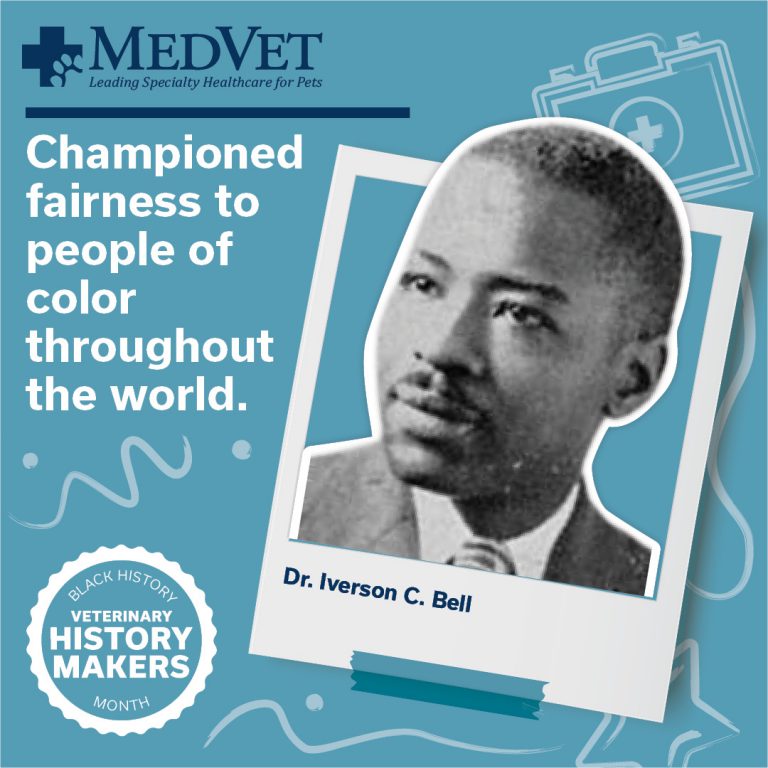At MedVet, we are proud to celebrate the beauty of individuality and the unique contributions that make our world a better place. In honor of Black History Month, we wanted to share stories from some Black History Makers who have made an impact on the veterinary profession. These pioneers in the field broke through barriers and helped shape the future of veterinary medicine. We’re excited to honor their contributions to the profession.
Dr. Frederick Douglass Patterson
Although you may recognize the name Frederick Douglass Patterson, you may not realize the impact he had on the veterinary profession. He received his Ph.D. at Cornell in 1932 and three years later became the third president of Tuskegee Institute (now University). Dr. Patterson also founded Tuskegee’s Veterinary College, making it possible for Black students to receive a veterinary education in the segregated South. His progressions paved the way for these students to pursue veterinary medicine.
Dr. Patterson established the “United Negro College Fund” in 1944 and was awarded the Presidential Medal of Freedom in 1987. Have you ever heard the phrase, “A mind is a terrible thing to waste?” This is attributed to Dr. Patterson!

Dr. Jane Hinton
In 1939, Jane Hinton completed her undergraduate degree at Simmons College at the age of 20 and went to work at Harvard laboratories. During that time, she was also studying as an assistant to Dr. J. H. Mueller at the New England Medical Center. Her work helped to develop the Mueller-Hinton agar, which became essential to testing antibiotic susceptibility in pathogens.
She then pursued her interest in veterinary medicine, graduating from the University of Pennsylvania School of Veterinary Medicine in 1949. She and Dr. Alfreda Johnson Webb became the first Black women to become Doctors of Veterinary Medicine in the United States and the first Black members of the Women’s Veterinary Medicine Association.

Dr. Alfreda Johnson Webb
Dr. Alfreda Johnson Webb earned her undergraduate degree in 1943 from Tuskegee Institute (now University) and continued her education there, receiving her Doctor of Veterinary Medicine from Tuskegee’s School of Veterinary Medicine in 1949. She joined Dr. Jane Hinton as the first Black women in the country to graduate with veterinary degrees. The two were also the first Black members of the Women’s Veterinary Medicine Association.
Dr. Johnson Webb served as an instructor of anatomy at Tuskegee, rising to the role of associate professor. Then she moved to join the faculty at North Carolina Agricultural & Technical State University as a biology professor. During her time there, she also served on the planning committee that developed the veterinary school that opened at North Carolina State University in 1981. In 2016, the North Carolina State College of Veterinary Medicine established a scholarship in her name for two students from under-represented groups.

Dr. Iverson C. Bell
After serving in WWII, Iverson C. Bell earned his Doctor of Veterinary Medicine degree from Michigan State University in 1949. Following graduation, Dr. Bell became a founding professor of small animal medicine at Tuskegee University School of Veterinary Medicine. Throughout his life, he continued to hold veterinary medicine leadership positions, including the Vice President of the American College of Veterinary Medicine from 1971-1973.
Dr. Bell worked tirelessly to champion fairness to people of color throughout the world. During his career, he held leadership roles in the NAACP and served as the Ambassador to Nigeria. Because of his commitments to diversity in the veterinary profession and beyond, the American Veterinary Medical Association holds the Iverson Bell Symposium to educate the veterinary community on the importance of inclusion and understanding.

Dr. Lloyd B. Mobiley
Lloyd B. Mobiley graduated with a Doctor of Veterinary Medicine degree from Kansas State University School of Veterinary Medicine in 1938, becoming one of the first Black veterinary medicine students in the school’s history. After serving as an Army officer in WWII, Dr. Mobiley was appointed head of the Department of Anatomy at Tuskegee University in 1952.
It was here where he introduced the use of the intramedullary pin and other devices in the repair of long-bone fractures. His contribution and devices are still used in veterinary medicine to this day, including by our MedVet Veterinary Surgeons!

Dr. Diarra Blue, Dr. Aubrey Ross and Dr. Michael Lavigne
The Vet Life is the first-ever TV series that follows three Black veterinarians who own and run a full-service veterinary hospital and animal shelter in Houston, Texas. The series premiered in 2016 and follows Dr. Diarra Blue, Dr. Aubrey Ross, and Dr. Michael Lavigne. Each attended Tuskegee University College of Veterinary Medicine, where they earned their Doctor of Veterinary Medicine degrees.

Dr. Erika Gibson
Dr. Erika Gibson, the first Black veterinary neurologist in America, is board-certified in Veterinary Neurology. Her areas of expertise are issues within the brain and spinal cord. She is currently a Veterinary Neurosurgeon at Guardian Veterinary Specialists in New Jersey.
Dr. Gibson graduated from Tuskegee School of Veterinary Medicine, followed by a one-year rotating internship in small animal medicine and surgery at Michigan State University and a three-year veterinary neurology and neurosurgery residency at the University of Pennsylvania School of Veterinary Medicine.


